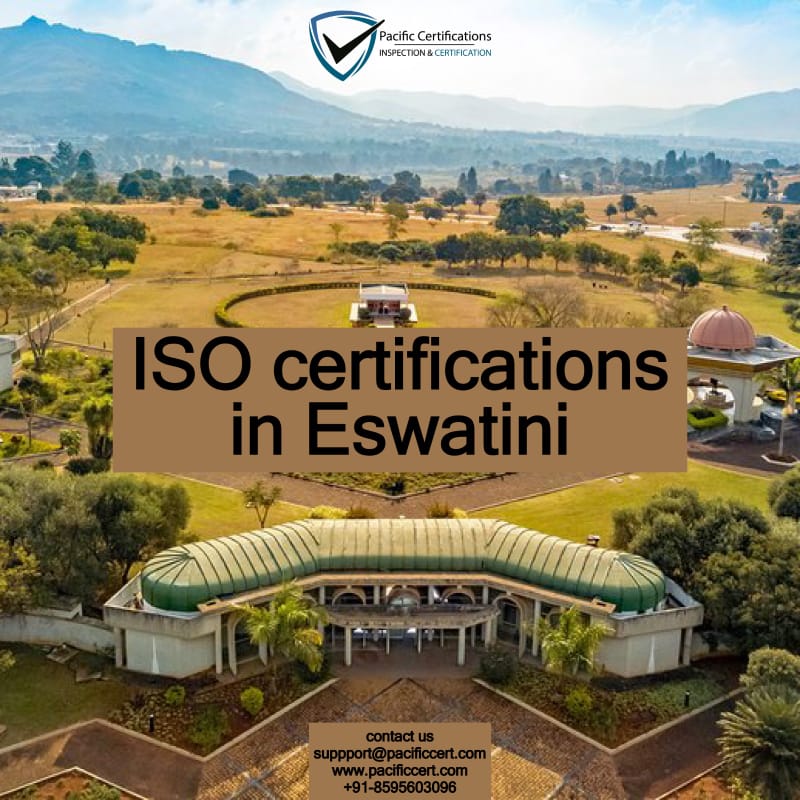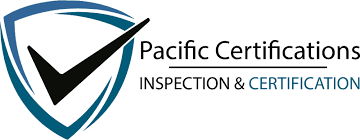ISO Certifications in Eswatini, Popular Standards, Requirements and Benefits

Introduction
Eswatini, like many other countries, recognizes the importance of ISO certifications to ensure quality, safety, environmental responsibility, and information security among businesses and organizations. As a global standard, ISO certifications in Eswatini can help companies improve their efficiency and competitiveness both locally and internationally.
ISO standards in Eswatini
ISO 9001:2015 (Quality Management Systems)
This is widely applied across various industries for improving product and service quality.
ISO 14001:2015 (Environmental Management Systems)
Relevant for organizations looking to enhance their environmental performance.
ISO 45001:2018 (Occupational Health and Safety Management Systems)
Crucial for ensuring safety in the workplace.
ISO 27001:2022 (Information Security Management Systems)
Important for businesses that deal with data security and information protection.
ISO 22000:2018 (Food Safety Management Systems)
Suitable for companies in the food chain, from production to distribution.
Click here to find out more applicable standards to your industry
How we at Pacific Certifications Can Assist?
We are a certification body accredited by ABIS, offers several services that can assist businesses in Eswatini with obtaining and maintaining ISO certifications:
Pre-Audit Assessment
We can provide a preliminary assessment to identify the current compliance status of your organization with the desired ISO standard. This helps in recognizing areas that need improvement before the formal audit and certification process.
Audit and Certification
- Initial Certification Audit: This is divided into two stages:
- Stage 1: Evaluation of your organization's documented procedures and policies against the requirements of the ISO standard.
- Stage 2: A more detailed and thorough assessment, including on-site inspection, to verify that practices are consistent with documented policies and that procedures are effectively implemented and maintained.
- Certification Issuance: Following a successful audit, a certification is issued which is proof that your management system complies with the specific ISO standard.
Surveillance Audits
We conduct regular surveillance audits to ensure ongoing compliance with the ISO standards and to help businesses continually improve their processes.
Recertification
ISO certifications are typically valid for three years, after which a recertification audit is necessary. Pacific Certifications manages the recertification process to ensure uninterrupted certification.
Training and Support
Training sessions can be arranged to help staff understand the requirements and importance of ISO standards, thereby facilitating better internal compliance and awareness.
Organizations interested in pursuing ISO certifications in Eswatini can reach out to us at Pacific Certifications at [email protected] for a detailed consultation and tailor-made services to meet specific certification needs.
Requirements of ISO Certifications in Eswatini
Organizations in Eswatini seeking ISO certification, the requirements largely align with international standards. Here's a detailed breakdown of the common requirements across several frequently sought ISO certifications:
ISO 9001:2015 - Quality Management Systems requirements:
- Documented Information: Maintain documentation that demonstrates the QMS (Quality Management System) and processes.
- Leadership Commitment: Top management must demonstrate leadership and commitment to the QMS.
- Customer Focus: The organization must ensure customer requirements are understood and met.
- Risk Management: Identify and address risks associated with your operations.
- Process Approach: Manage activities as processes and integrate them into the system for better performance.
- Continuous Improvement: The organization must continually improve the effectiveness of its QMS.
ISO 14001:2015 - Environmental Management Systems requirements:
- Environmental Policy: Develop an environmental policy appropriate to the nature and scale of organizational activities.
- Planning: Identify environmental aspects, legal requirements, and other obligations.
- Resources: Allocate resources necessary for the implementation and control of the EMS (Environmental Management System).
- Operational Control: Implement controls to manage significant environmental aspects, compliance obligations, and emergency preparedness and response.
ISO 45001:2018 - Occupational Health and Safety Management Systems requirements:
- Worker Participation: Ensure the participation and consultation of workers in the development, planning, implementation, and continual improvement of the OH&S management system.
- Hazard Identification: Identify hazards and assess OH&S risks associated with organizational activities.
- OH&S Objectives: Establish objectives that align with the OH&S policy and are measurable.
- Performance Evaluation: Monitor, measure, analyze, and evaluate OH&S performance.
ISO 27001:2022 - Information Security Management Systems requirements:
- Security Policy: Develop an information security policy that is reviewed regularly.
- Risk Assessment: Conduct regular information security risk assessments and identify treatment options.
- Security Controls: Implement suitable controls to mitigate identified risks and protect confidentiality, integrity, and availability of information.
- Incident Management: Develop processes to manage and report information security incidents.
ISO 22000:2018 - Food Safety Management Systems requirements:
- Food Safety Policy: Develop a policy that states organizational commitments to food safety.
- HACCP Principles: Implement and maintain a food safety system based on HACCP (Hazard Analysis Critical Control Point) principles.
- Prerequisite Programs: Establish basic conditions and activities to maintain a hygienic environment throughout the food chain.
- Traceability System: Implement a system to identify product lots and their status throughout the production, processing, and distribution.
Companies in Eswatini can reach out to Pacific Certifications through our support channel at [email protected] for guidance through the certification process tailored to their specific needs.
Benefits of ISO Certifications in Eswatini
Adopting ISO standards can help local businesses integrate into global supply chains, attract international partners, and meet regulatory and customer requirements more effectively. Here’s a closer look at the key benefits:
Enhanced Quality and Efficiency
- Consistency: ISO 9001 helps organizations standardize their processes, ensuring consistent quality of products and services, which can lead to higher customer satisfaction.
- Process Improvement: Implementing ISO standards encourages a thorough review of processes, identifying inefficiencies and opportunities for improvement.
Increased Credibility and Marketability
- International Recognition: ISO certifications are recognized globally, which can enhance the credibility of Eswatini businesses when competing in international markets.
- Customer Trust: Certification can serve as a testament to a company's commitment to quality and reliability, which can be a decisive factor in purchasing decisions.
Regulatory Compliance
- Adherence to Laws: Many ISO standards help organizations comply with relevant legislation, such as environmental, safety, and data protection laws, which can reduce the risk of legal penalties.
- Updated Practices: Regular surveillance audits required by ISO ensure that organizations keep their practices up to date with both the standards and applicable regulations.
Environmental and Safety Improvements
- Environmental Impact: ISO 14001 helps organizations minimize their environmental footprint by managing the environmental impacts of their operations, which is also increasingly important for consumers and business partners.
- Worker Safety:ISO 45001 provides a framework for ensuring a safe working environment, reducing the potential for accidents and improving overall worker welfare.
Risk Management
- Proactive Risk Assessment: ISO standards such as ISO 27001 for information security require organizations to assess and manage risks proactively, helping prevent issues before they occur.
- Business Continuity: Many ISO standards help in establishing practices that ensure the continuity of business operations under various conditions, enhancing resilience.
Operational Flexibility and Resilience
- Adaptability: By formalizing business processes, organizations can quickly adapt to changes in the market or operational disruptions, with clear procedures to follow.
- Sustainability: Implementing ISO standards can contribute to long-term sustainability goals by improving resource efficiency and reducing waste.
Access to New Markets
- Compliance and Certifications: Certain markets require specific ISO certifications as a prerequisite for doing business. Being certified can open new business avenues both domestically and internationally.
Interested organizations in Estwatini can contact us at [email protected] for more information on starting the certification journey.
Which Industries need ISO Certifications in Eswatini?
In Eswatini, like in many other countries, industries across various sectors benefit from implementing ISO certifications to enhance quality, ensure safety, manage environmental impact, and protect information.
Here’s a look at which industries in Eswatini might particularly benefit from different types of ISO certifications:
Manufacturing
- ISO 9001 for Quality Management Systems is crucial to ensure the quality and consistency of products.
- ISO 14001 helps manage environmental aspects of manufacturing processes.
- ISO 45001 is essential for ensuring workplace safety in environments that can often be hazardous.
Agriculture and Food Production
- ISO 22000 and other food safety management certifications ensure that food products are safe for consumption and meet international standards.
- ISO 14001 can also be beneficial for managing environmental impact in agriculture, focusing on sustainable practices.
Healthcare
- ISO 13485 is designed specifically for quality management in the manufacture of medical devices.
- ISO 9001 helps healthcare providers streamline their operations and enhance patient care quality.
Construction and Engineering
- ISO 9001 ensures quality management throughout construction projects, from planning to execution.
- ISO 14001 and ISO 45001 are crucial for managing environmental impact and ensuring worker safety on construction sites.
Information Technology and Services
- ISO 27001 is vital for information security management, particularly important in industries handling large amounts of sensitive data.
- ISO 20000-1 focuses on service management, ensuring IT services are managed effectively and efficiently.
Education
- ISO 21001 is a management system standard for educational organizations that helps deliver educational services that meet learner and other beneficiary needs.
- ISO 9001 can also be applied to improve management processes in educational institutions.
Tourism and Hospitality
- ISO 9001 can help tourism companies enhance customer satisfaction by improving service quality consistently.
- ISO 22000 is important for food safety management in hotels and restaurants.
Mining
- ISO 14001 for environmental management and ISO 45001 for occupational health and safety are critical in the mining industry due to the high environmental impacts and safety risks associated with mining activities.
Finance and Banking
- ISO 27001 is essential for managing information security, a critical aspect given the sensitivity of financial data.
Conclusion
We at Pacific Certifications can assist businesses across these sectors in Eswatini by providing tailored support for achieving ISO certifications.
Pacific Certifications is accredited by ABIS, in case you need support with ISO certification for your business in Estwatini, please contact us at [email protected]or +91-8595603096.
Ready to get ISO certified?
Contact Pacific Certifications to begin your certification journey today!
Suggested Certifications –
Read more: Pacific Blogs

